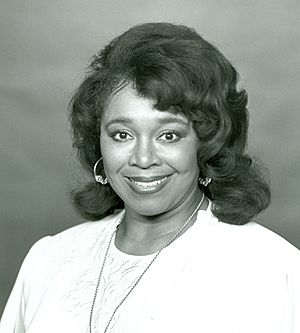Barbara-Rose Collins facts for kids
Quick facts for kids
Barbara-Rose Collins
|
|
|---|---|
 |
|
| Member of the Detroit City Council | |
| In office 2001–2009 |
|
| In office 1982–1991 |
|
| Member of the U.S. House of Representatives from Michigan |
|
| In office January 3, 1991 – January 3, 1997 |
|
| Preceded by | George W. Crockett, Jr. |
| Succeeded by | Carolyn Cheeks Kilpatrick |
| Constituency | 13th district (1991–93) 15th district (1993–97) |
| Member of the Michigan House of Representatives from the 21st district |
|
| In office 1975–1981 |
|
| Personal details | |
| Born |
Barbara-Rose Richardson
April 13, 1939 Detroit, Michigan, U.S. |
| Died | November 4, 2021 (aged 82) Detroit, Michigan, U.S. |
| Political party | Democratic |
| Education | Wayne State University (BA) |
Barbara-Rose Collins (born Richardson; April 13, 1939 – November 4, 2021) was an American politician. She was from the state of Michigan. She made history as the first Black woman from Michigan to be elected to the U.S. Congress.
Contents
Early Life and Education
Barbara-Rose Richardson was born in Detroit, Michigan. Her father worked for Ford Motor Co. She went to Cass Technical High School in Detroit. After high school, she studied at Wayne State University. She earned a Bachelor of Arts degree there. Her studies focused on Political Science and Anthropology.
Starting Her Career
In 1960, Barbara-Rose Collins became a single mom after a divorce. She worked several jobs to support her family. She also received public assistance for a time. Later, she started working as a Business Manager. This job was in the Physics department at Wayne State University. She worked there for nine years.
Becoming a Politician
Barbara-Rose Collins was inspired to become an activist. She heard a speech by Black activist Stokely Carmichael. This speech took place in the late 1960s. It made her want to help communities. Her church pastor encouraged her to run for a seat in the state legislature. She decided to run in 1974.
A New Name for a New Path
During her 1974 campaign, Barbara-Rose made a change. She added a hyphen to her name, becoming Barbara-Rose. This helped her stand out from other candidates. From then on, she was known as Congresswoman Barbara-Rose Collins.
Serving Her Community
Collins served in several important roles.
- From 1971 to 1973, she was on the Detroit Public School Board. She was known for focusing on school safety and student success.
- From 1975 to 1981, she was a member of the Michigan House of Representatives. She represented the 21st district.
- From 1982 to 1991, she served on the Detroit City Council.
Joining the U.S. Congress
In 1988, Collins ran for the United States House of Representatives. She lost that election. But when the current representative retired, she ran again. She won the election in 1990. This made her the first Black woman from Michigan in Congress. She was reelected three more times. Her district was later renumbered as the 15th district.
Key Laws and Efforts
Barbara-Rose Collins helped create several important laws.
- She sponsored the Food Dating Bill.
- She also sponsored the Sex Education Bill.
- Another bill she supported was the Pregnancy Insurance Bill.
The Unpaid Work Bill
Collins also worked on a special bill called the Unrenumerated Work Act. She introduced this bill in 1991, 1993, and 1994. This bill would have asked the government to measure the value of unpaid work. This includes things like housework, caring for family, and volunteer work. The goal was to include this value in the country's total economic output. Many people supported this idea, but the bill did not pass.
Later Political Career
In 1995, Collins faced an inquiry. This was about how some funds were used. In 1996, she lost her bid for re-election. After that, the inquiry was dropped. After five years, she returned to the Detroit City Council in 2001. She was re-elected in 2005 and retired in 2009.
Making Juneteenth a Holiday
Barbara-Rose Collins played a big part in making Juneteenth a federal holiday. In 1996, she proposed a bill to do this. She spoke about how slavery was prolonged for many Black people. She said the government failed to share the truth. Because of her efforts, Juneteenth became a federal holiday in 2021.
Death
Barbara-Rose Collins passed away on November 4, 2021. She was 82 years old. She died from COVID-19 in a Detroit hospital. She had been vaccinated against COVID-19. However, she also had other health issues.
See also
- List of African-American United States representatives
- List of federal political scandals in the United States
- Women in the United States House of Representatives

